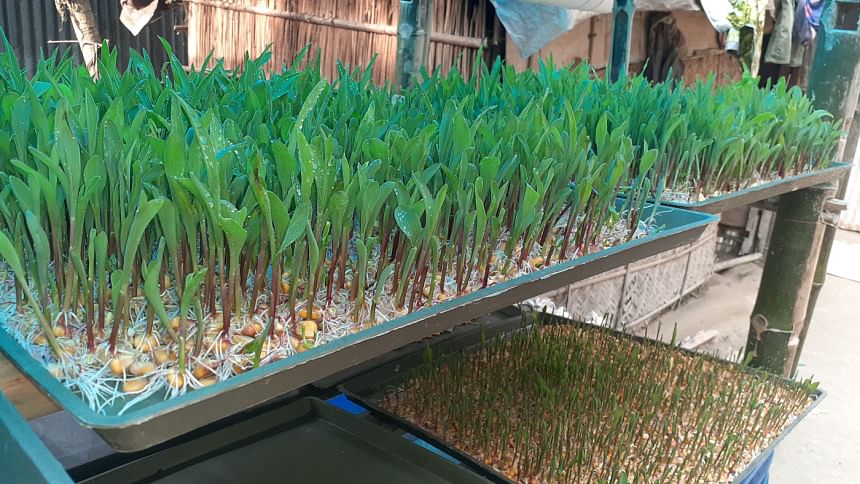Govt to take Tk 101cr project promoting better fodder

The government is likely to approve a Tk 101 crore scheme today to promote cultivation of improved varieties of grass among dairy and beef cattle farmers to boost yields and reduce their high dependence on concentrate feed.
"We have a huge shortage of green fodder compared with the requirement to animal rearing for milk and meat production," said Nanda Dulal Tikader, upazila livestock officer at the Livestock Economics Section at the Department of Livestock (DLS).
"The current production of high-yielding varieties of fodder is very low," he reasoned for the project being taken up.
Animal farming is gaining popularity as a section of people are signing up to produce milk and meat to cater to the domestic requirement.
Over the past decade, the number of animals rose: from 5.16 crore in fiscal 2010-11 to 5.60 crore in fiscal 2019-20 – alongside production of milk and meat.
Milk production grew fourfold to 1 crore tonnes in FY20, showed DLS data.
Yet, Bangladesh has to import a good amount of milk and dairy products. The country spent Tk 2,900 crore in FY20 to buy milk and dairy products from abroad, up 4 per cent from a year ago, showed data from the Bangladesh Bank.
Tikader said farmers have to depend highly on concentrate feed owing to inadequate production of green fodder. Such a dependence on concentrate keeps production cost of milk and meat high, he said.
Green fodder production is a must for cattle farming and high yielding and protein-rich fodder will be instrumental in reducing cost and improving yield, he said, adding that green fodder would help with vitamin supplementation of cows.
A crossbreed animal requires 20-25 kilogrammes of green fodder daily, said Tikader, adding that the use of green fodder in place of concentrate feed would reduce milk and meat production cost of farmers by 20 per cent.
Currently, Napier grass is mainly cultivated in the country. Another Packchong variety of grass is also being promoted among farmers for cultivation, according to the official.
Under the Tk 101 crore project, the DLS wants to establish a germplasm nursery for the collection of genetic resources at the Central Cattle Breeding and Dairy Farm, Savar, Dhaka.
It also plans to prepare 8,970 plots demonstrating cultivation of high-yielding varieties of grass for farmers.
The DLS aims to transfer technology of making silage and hay to enable nearly 18,000 farmers to preserve green grass in a scientific manner.
The DLS also plans to distribute protein-rich seeds of grass under the project, which is expected to be placed at an Executive Committee of National Economic Council meeting today.
The DLS targets to implement the project by March 2024.


 For all latest news, follow The Daily Star's Google News channel.
For all latest news, follow The Daily Star's Google News channel. 




Comments